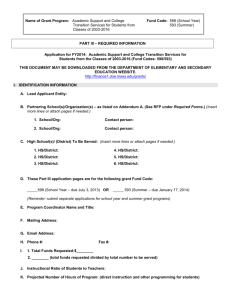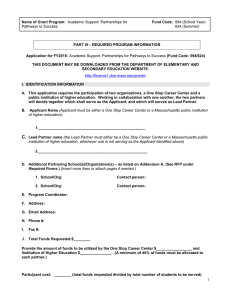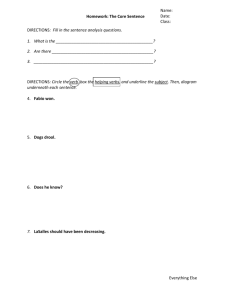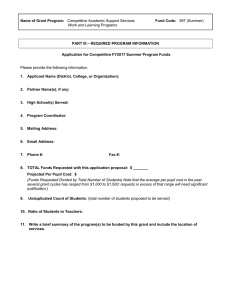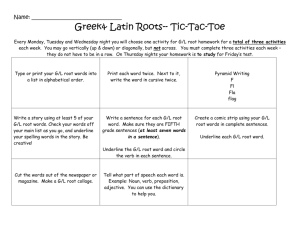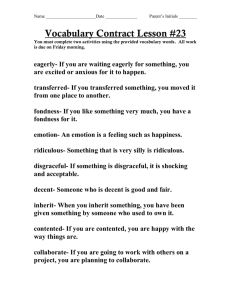598 593 a
advertisement
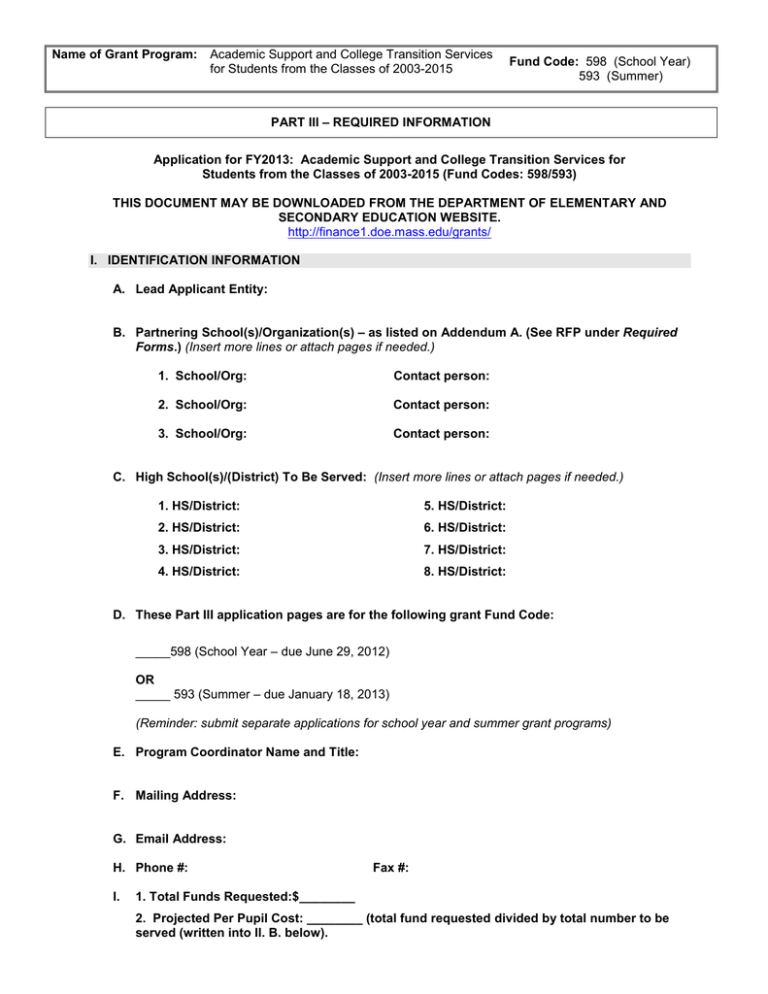
Name of Grant Program: Academic Support and College Transition Services for Students from the Classes of 2003-2015 Fund Code: 598 (School Year) 593 (Summer) PART III – REQUIRED INFORMATION Application for FY2013: Academic Support and College Transition Services for Students from the Classes of 2003-2015 (Fund Codes: 598/593) THIS DOCUMENT MAY BE DOWNLOADED FROM THE DEPARTMENT OF ELEMENTARY AND SECONDARY EDUCATION WEBSITE. http://finance1.doe.mass.edu/grants/ I. IDENTIFICATION INFORMATION A. Lead Applicant Entity: B. Partnering School(s)/Organization(s) – as listed on Addendum A. (See RFP under Required Forms.) (Insert more lines or attach pages if needed.) 1. School/Org: Contact person: 2. School/Org: Contact person: 3. School/Org: Contact person: C. High School(s)/(District) To Be Served: (Insert more lines or attach pages if needed.) 1. HS/District: 5. HS/District: 2. HS/District: 6. HS/District: 3. HS/District: 7. HS/District: 4. HS/District: 8. HS/District: D. These Part III application pages are for the following grant Fund Code: _____598 (School Year – due June 29, 2012) OR _____ 593 (Summer – due January 18, 2013) (Reminder: submit separate applications for school year and summer grant programs) E. Program Coordinator Name and Title: F. Mailing Address: G. Email Address: H. Phone #: I. Fax #: 1. Total Funds Requested:$________ 2. Projected Per Pupil Cost: ________ (total fund requested divided by total number to be served (written into II. B. below). Name of Grant Program: Academic Support and College Transition Services for Students from the Classes of 2003-2015 Fund Code: 598 (School Year) 593 (Summer) J. Instructional Ratio of Students to Teachers: K. Projected Number of Hours of Program: (direct instruction and other programming for students) II. GENERAL PROGRAM INFORMATION A. Describe the degree to which eligible students from the classes of 2003-2015 have a significant need for support services. What are specific academic needs of students to be served in programming? The focus of this portion should be on needs that can be directly addressed by school year or summer programming. Provide qualitative, quantitative, and anecdotal data if available. B. Total Number of Students to be served (from the classes of 2003-2015): __________ (This should equal the sum of the unduplicated counts in the three charts that are below and on the next page.) In the following charts 1-3, indicate the number of students to be served by class year, subject area, and sending district. Insert additional lines for additional districts, if needed. If students receive services in more than one content area, please count them in the appropriate content area columns in the charts below. Please only count these students once in the “Total Unduplicated” column. Your numbers in the “Total Unduplicated” column, will not necessarily be columns a + b + c if the same students receive multiple content area services. 1. CLASSES OF 2003-2012 (post-12th grade) Indicate the number of participants to be served by content area and most recent school district Most Recent School District a. ELA b. Mathematics c. Science and Technology/ Engineering Total Unduplicated TOTALS: Unduplicated Count Classes of 2003-2012 Name of Grant Program: Academic Support and College Transition Services for Students from the Classes of 2003-2015 Fund Code: 598 (School Year) 593 (Summer) 2. CLASS OF 2013 and 2014 (high school juniors and seniors during school year 2012-2013) Indicate the number of students to be served by content area and school district Sending School District a. ELA b. Mathematics c. Science and Technology/ Engineering Total Unduplicated TOTALS: Unduplicated Count Classes of 2013 and 2014 3. CLASS OF 2015 (high school sophomores during school year 2012-2013) Indicate the number of students to be served by content area and school district Sending School District a. ELA b. Mathematics c. Science and Technology/ Engineering Total Unduplicated TOTALS: Unduplicated Count Class of 2015 Name of Grant Program: Academic Support and College Transition Services for Students from the Classes of 2003-2015 Fund Code: 598 (School Year) 593 (Summer) C. Program Offerings and Schedule Complete the following schedule for the types of programs offered. Fill in chart 1 below for Fund Code: 598 (School Year) grant applications. Fill in chart 2 on the next page for Fund Code: 593 (Summer) grant applications. 1. FOR FUND CODE: 598 (SCHOOL YEAR) APPLICATIONS Program Type Weekday Services English Language Arts Time:____ to _____ (Monday-Friday) Underline classes to be served. Post-12th (2003-2012) 2013 2014 2105 Number of Students____ Weekend Day Services (Saturday-Sunday) Underline classes to be served. Post-12th (2003-2012) 2013 2014 2105 Number of Students____ M Mathematics Time:____ to _____ Science and Technology/ Engineering Time:____ to _____ Hrs/Day___ Days/Wk___ Hrs/Day___ Days/Wk___ Hrs/Day___ Days/Wk___ Underline days program meets. Underline days program meets. Underline days program meets. Tu W Th F M Tu W Th F M Tu W Th F Total weeks: _______ Total hours: _______ Start date: _______ End date: _______ Total weeks: _______ Total hours: _______ Start date: _______ End date: _______ Total weeks: _______ Total hours: _______ Start date: _______ End date: _______ Time:____ to _____ Time:____ to _____ Time:____ to _____ Hrs/Day___ Days/Wk___ Hrs/Day___ Days/Wk___ Hrs/Day___ Days/Wk___ Underline days program meets. Underline days program meets. Underline days program meets. Sat. Sun. Total weeks: _______ Total hours: _______ Start date: _______ End date: _______ Sat. Sun. Total weeks: _______ Total hours: _______ Start date: _______ End date: _______ Sat. Sun. Total weeks: _______ Total hours: _______ Start date: _______ End date: _______ Name of Grant Program: 2. Academic Support and College Transition Services for Students from the Classes of 2003-2015 Fund Code: 598 (School Year) 593 (Summer) FOR FUND CODE: 593 (SUMMER) APPLICATIONS Program Type Summer Services (July-August 2013) English Language Arts Time:____ to _____ Underline classes to be served. Post-12th (2003-201) 2013 2014 2105 Number of Students____ Mathematics Time:____ to _____ Science and Technology/ Engineering Time:____ to _____ Hrs/Day___ Days/Wk___ Hrs/Day___ Days/Wk___ Hrs/Day___ Days/Wk___ Underline days program meets. Underline days program meets. Underline days program meets. M Tu W Th F Sat Sun Total weeks: _______ Total hours: _______ Start date: _______ End date: _______ M Tu W Th F Sat Sun Total weeks: _______ Total hours: _______ Start date: _______ End date: _______ M Tu W Th F Sat Sun Total weeks: _______ Total hours: _______ Start date: _______ End date: _______ D. Location(s) of the program if not the same or in addition to what is listed on page two of this Part III document above (in I. Identification Information, F.) Full address:_____________________________________________________________________ Full address:_____________________________________________________________________ Full address:_____________________________________________________________________ III. NARRATIVE: PROGRAM DESIGN AND IMPLEMENTATION Please respond to the following questions from sections A-C, using no more than five (5) pages. SUMMARY: Additionally, please provide a 1-2 paragraph summary of the program. If awarded funding, this summary may be posted along with program contact information on the Department’s Academic Support website. A. PROGRAM TIMELINE AND DESIGN 1. Provide a general overview of program activities, including the timeline for such activities, and any partnerships involved. Please describe a timeline for planning efforts as well as services to be provided. Program activities and timeline should include student contact dates as well as academic sessions. a. Timeline and Summary of Program Activities Fund Code: 598 applications should provide a timeline and summary for services/activities between September 1, 2012 and June 30, 2013. Fund Code: 593 applications should provide a timeline and summary for services/activities from July 1, 2013 through August 31, 2013. Name of Grant Program: Academic Support and College Transition Services for Students from the Classes of 2003-2015 Fund Code: 598 (School Year) 593 (Summer) b. Partnerships Describe plans to collaborate with partners that provide services and opportunities for participating students. Partners may include but are not necessarily limited to One Stop Career Centers; Work and Learning Initiative grant recipients; high schools; local businesses; community-based organizations; and departments/offices within a college such as enrollment services, admissions, and other internal college organizations and programming. Identify the partners and provide a description of any efforts already undertaken by the partners submitting this application. Describe expectations for continued efforts and value that the partners will bring to students and the program in regards to collaborative planning for this proposal, including but not limited to the following: engaging partners in the planning process for this grant; convening program partners; and identifying partner roles in program delivery for academic support and college transition purposes. Also, please complete the Pathways Initiative FY2013 Collaboration Agreement among Higher Education Institutions, One Stop Career Centers, and other Partners (Addendum A). 2. Describe academic support services as well as college transition activities that will be offered. a. Describe how student performance data will be used in creating programming. Relevant student performance data may include results from the Massachusetts Comprehensive Assessment System (MCAS), Early Warning Indicator data, the Massachusetts English Proficiency Assessment (MEPA), Accuplacer, and other student performance data. How will the program use these data to individualize (personalize) instruction and services to best meet student needs? b. Describe the instructional methods, materials, assessment, and environment for the program and how it will be conducive to meeting the learning needs of the students. This description should include but is not limited to: How will this curriculum, instruction, and assessment actively engage students in rigorous learning standards in the Massachusetts Curriculum Frameworks in the addressed content areas? What college academic and enrichment programs or activities are available that may support or enhance student learning? Where applicable, how will these methods address English language learners, students with disabilities, students with behavioral health issues, and students with very low MCAS scores? What explicit connections are made in instruction to develop critical thinking and problem solving, communication, collaboration, creativity, and innovation skills (development of 21st Century Skills) needed to be successful in careers and post-secondary education? For more information please see http://www.21stcenturyskills.org/. c. Describe other college and career transition activities that will assist students in obtaining their Competency Determination and accessing post-secondary education or a career. Describe any specific pathways or activities for students to gain access to credited degrees, certificates, or other programs at the applicants’ institutions; including what counseling/support services, monitoring, or infrastructure may help students become career and college ready. Name of Grant Program: Academic Support and College Transition Services Fund Code: 598 (School Year) for Students from the Classes of 2003-2015 593 (Summer) B. STUDENT RECRUITMENT AND RETENTION Describe recruitment and retention strategies for students most in need of services (particularly students from the Classes of 2003-2012, students who need to make significant progress in order to meet state and local graduation requirements, students with disabilities, and limited English proficient students). Address the following aspects in the plan: 1. Methods and messages used to maximize participation, including materials developed to maximize participation and plans to distribute these materials; 2. Efforts designed to maximize program retention; 3. The role of partners in recruitment and retention (e.g., high schools, community-based organizations, faith-based organizations, employment and training providers, businesses, One Stop Career Centers, etc.); 4. Efforts to build an environment that is caring and supportive, including any efforts to address logistical and/or behavioral health issues that present themselves as barriers to learning; 5. Incentives offered, if any, including credit and other college incentives that encourage enrolling and persisting in higher education, work and learning, internship and service learning opportunities, as well as other tangible incentives and the criteria for earning them; please note that compensation for attendance is not an allowable use of funds and 6. Specific added value brought by the institute of higher education and integration of programming into the college for wraparound supports and college and career access. C. STAFFING 1. Provide a detailed timeline for recruitment of staff for the program and indicate the number of staff and staff qualifications. NOTE: Recipients of these grants must agree to provide staff who have subject matter knowledge in the subjects they are teaching. Also, the programs must have some staff available with training or education that address working with limited English proficient students or students with disabilities. 2. Briefly describe any professional development activities, orientation activities, and/or common planning time to be provided to staff prior to the beginning of the program, during the program, and/or after the program concludes. 3. If a coordinator position is funded through this grant, describe his or her role and responsibilities.
